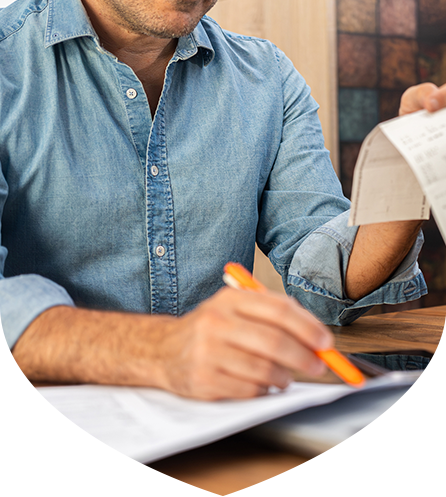Financial Wellness
How to Prepare for These Common Unexpected Expenses
One of the biggest keys to financial stability is to always be prepared for unexpected expenses. Anything from a car repair or home appliance breakdown to a medical emergency or unplanned travel can take a serious toll on your wallet. But there are several ways to stay ready for these scenarios and minimize the financial impact.
Before you develop a plan, however, it's important to understand what some of the most common unexpected expenses are, as knowing what to expect can help you prepare.
If you've had an unforeseen car accident in which your car is totaled, we're here to help with excellent financing options for your next vehicle. Explore our auto loan options.
We offer solutions like home equity loans, HELOCs, and home improvement loans to help cover the cost of repairs. If a major renovation is more of what you had in mind, we have an option for that too.
Other common unexpected expenses
Set up automatic deposits after each paycheck. Contribute as much as you reasonably can, but don't worry if you can only deposit a small amount of money—just $10 a week can add up to $520 in a year.
A good emergency fund goal is to set up 3-6 months of basic living expenses, but any money set aside can cushion the financial impact when an unexpected expense arrives.
With car insurance, make sure your policy matches your situation. Calculate deductibles against monthly payments and decide what you can afford. If you own a newer car rather than an old clunker, it might make more sense to select more expensive collision coverage.
Ask your insurance company if you are eligible for any discounts. For example, if you take part in a defensive driving course, are a student, have multiple vehicles, are a good driver, or a member of certain organizations, like AAA, you may qualify for discounts that will bring your premium cost down.
Calculate all the necessary things you purchased in a given month; then, add them all up and divide by 12 to get your monthly costs.
Once you've done that, you can see how much you've paid for truly unforeseen expenses. That's where your emergency fund comes in. It should help you pay for things you really need and can't put off, like repairing damage to a vehicle or home or emergency medical expenses. If you're thinking of purchasing something optional, don't draw from your emergency fund. The expense should be both urgent and absolutely essential to qualify.
Before you develop a plan, however, it's important to understand what some of the most common unexpected expenses are, as knowing what to expect can help you prepare.
Examples of unexpected expenses
Auto expenses
Car payments and insurance are predictable, recurring expenses, but what about a flat tire, cracked windshield, or car accident? Even if your insurance covers those incidents, your payments may increase, and there may still be other out-of-pocket costs for repairs.If you've had an unforeseen car accident in which your car is totaled, we're here to help with excellent financing options for your next vehicle. Explore our auto loan options.
Home repair expenses
No one wants to deal with a cracked foundation, mold damage, burst pipes, or grading or ponding issues—all of which can cost thousands of dollars to repair—but they all can happen to any homeowner. While homeowners insurance helps, it might not cover everything. If you own a home or are planning to buy one soon, you'll need to have plans in place for unexpected expenses.We offer solutions like home equity loans, HELOCs, and home improvement loans to help cover the cost of repairs. If a major renovation is more of what you had in mind, we have an option for that too.
Medical expenses
When medical treatments and procedures happen, there is always a chance for extra charges beyond what your insurance may cover. Deductibles, copays, and other surprise bills can become a burden, especially if ambulance transportation is needed or if the hospital is out of your insurance plan's network.Unplanned travel and event expenses
Sometimes you have to travel at the last minute. Family emergencies or other important can't-miss events, such as a funeral or wedding, can be expensive if you're not prepared. Airfare, hotel rooms, parking, and rental cars can make even a one- or two-day trip a bear if you're not financially ready.Other common unexpected expenses
- Emergency vet care
- Natural disasters
- Rent or utility bill increases
- Funeral costs
How to plan for unexpected expenses
Set up an emergency savings fund
The best way to be prepared for any sort of unexpected expense is to set up an emergency fund, and doing so in a savings account is a great way to ensure your money will continue to grow interest and is easy to access when you need it.Set up automatic deposits after each paycheck. Contribute as much as you reasonably can, but don't worry if you can only deposit a small amount of money—just $10 a week can add up to $520 in a year.
A good emergency fund goal is to set up 3-6 months of basic living expenses, but any money set aside can cushion the financial impact when an unexpected expense arrives.
Evaluate your insurance coverage
Stay on top of how much you're paying toward any insurance plan and re-evaluate if something doesn't seem right. Are you paying too much? Too little? Do you have the right kind of coverage? For medical coverage, consider all risk factors when deciding what level of insurance you need, including previous diagnoses and genetic risk factors if you have a family history of issues.With car insurance, make sure your policy matches your situation. Calculate deductibles against monthly payments and decide what you can afford. If you own a newer car rather than an old clunker, it might make more sense to select more expensive collision coverage.
Ask your insurance company if you are eligible for any discounts. For example, if you take part in a defensive driving course, are a student, have multiple vehicles, are a good driver, or a member of certain organizations, like AAA, you may qualify for discounts that will bring your premium cost down.
Track your spending
It's always smart to stay on top of where your money is going, and that's easy to do in Digital Banking—just use our Spending Trends and Savings Goals features.Calculate all the necessary things you purchased in a given month; then, add them all up and divide by 12 to get your monthly costs.
Once you've done that, you can see how much you've paid for truly unforeseen expenses. That's where your emergency fund comes in. It should help you pay for things you really need and can't put off, like repairing damage to a vehicle or home or emergency medical expenses. If you're thinking of purchasing something optional, don't draw from your emergency fund. The expense should be both urgent and absolutely essential to qualify.
Resources: Self.inc, MetLife, Cash Lady


